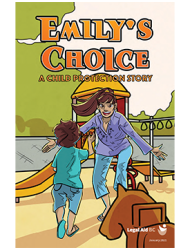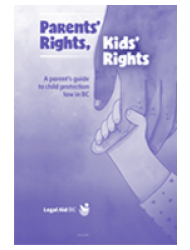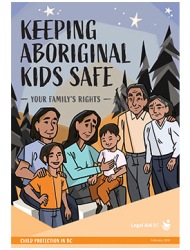A child protection story
Emily is struggling with addiction and an unhealthy relationship. She loves her son, Greg, but can't always take care of him. When Greg goes into foster care, Emily is heartbroken. But by getting legal help and with the support of her family, she gets Greg back. Emily's Choice is Emily's story. Find out more information about this video.
The social worker comes to Emily's home
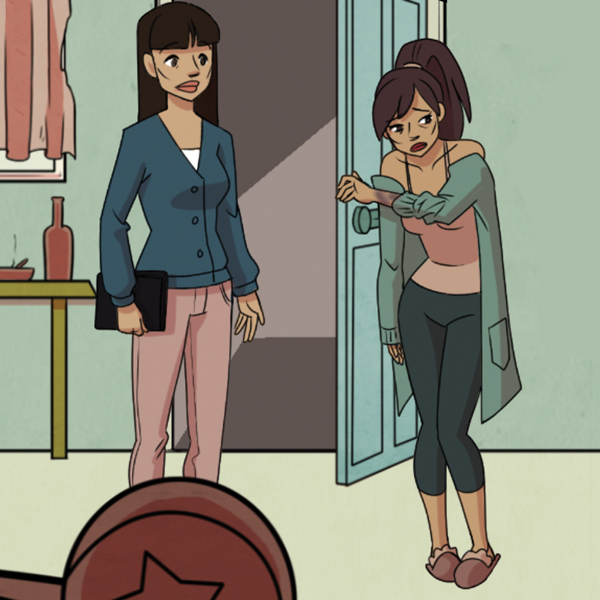
If a child protection worker (social worker) from the Ministry of Children and Family Development or a delegated Aboriginal agency contacts you or visits your home, this means they think your child might be at risk. They're looking into it. This is part of the child protection process. (This is also called an investigation.) An investigation is serious. The social worker may take your child from your home.
You, your family, and your community have rights. The law says the ministry should respect your child's family ties and Aboriginal identity.
What can Emily do?
Emily got the help she needed. If you're in her situation, here's what you can do.
Call Legal Aid right away
If a social worker contacts you or visits your home, you have the right to get legal advice. Call Legal Aid immediately to find out if you qualify for a free lawyer:
604-408-2172 (Greater Vancouver)
1-866-577-2525 (no charge outside Greater Vancouver)
Ask for a mediator
A mediator can help you work with the ministry. A mediator is a professional who's specially trained to:
-
not take sides,
- help people reach an agreement, and
- help people work out conflicts.
You can ask for a mediator as soon as the social worker contacts you. You can also ask at any time during the child protection process. How you get a mediator may be different in every community. Ask your lawyer or social worker for more information.
Mediation is free for families involved with the ministry. Mediators can travel to remote communities.
Words you might hear
Child protection
If a child's safety is at risk, the Ministry of Children and Family Development (or a delegated Aboriginal agency) must look into it. If necessary, the ministry must take your child from your home.
Child protection worker
A social worker with the authority to provide child welfare services. They look into complaints about child abuse and neglect and can remove children from their homes.
Investigation
If a child protection worker (social worker) from the Ministry of Children and Family Development (or a delegated Aboriginal agency) contacts you or visits your home to ask questions about your family. They may also get in touch with other people who have contact with you and your child. Depending on what the social worker learns, they may decide to take your child from your home.
The ministry
The Ministry of Children and Family Development and/or delegated Aboriginal agencies.
The Director
The Director of Child Protection, who is appointed by the Ministry of Children and Family Development to make sure children are safe and well cared for.
Delegated Aboriginal agency
An organization that has an agreement with the Ministry of Children and Family Development to provide certain child welfare services to Aboriginal families and communities.
The social worker puts Greg in foster care
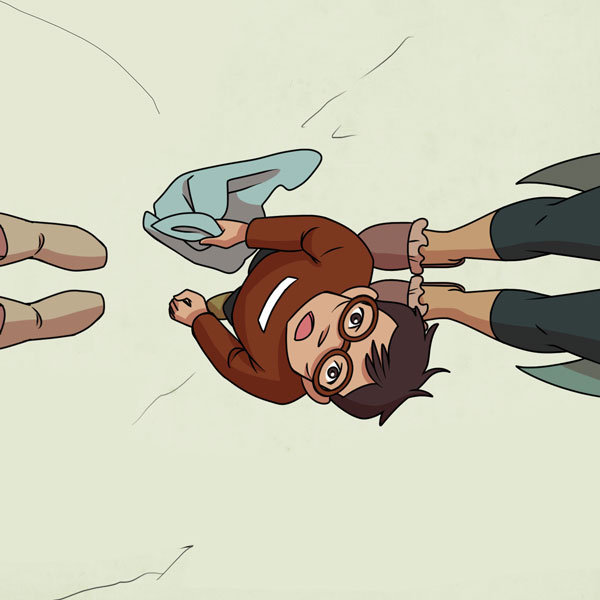 What can a parent like Emily do?
What can a parent like Emily do?
- Get legal advice before the day of court. Call Legal Aid immediately to find out if you qualify for a free lawyer.
- Ask for visits with your child
- Work out a plan with your band or community that supports your child's family ties and Aboriginal identity
- Ask the social worker to place your child with another Aboriginal family
- Ask for a mediator
- Ask for the Report to Court, which explains why your child was removed
What the ministry must do
- Notify your child's Aboriginal community representative (such as the First Nation band)
- Take steps to protect your child's family ties and Aboriginal identity
- consider your child's family ties and Aboriginal identity when choosing a foster home
- In many cases, allow a representative from your child's band or Aboriginal community to go to court
What can Dwayne do?
Support Greg
Even if children aren't placed with them, family members can help them feel safe and loved.
- Go to child and family team meetings
- Visit children in care
- Share information about their family background (for example, health history)
Support Emily
Family members can also support the parents as they go through the child protection process.
- Help parents get organized and to keep track of all the appointments and documents
- Stay connected to parents who are in crisis. Often people in crisis withdraw from their social circles. Call or stop by to offer your support.
- Offer concrete support, like helping with household chores or driving the parent to appointments or to court dates
- Provide parenting support, like childcare or picking children up from school
- Speak to the social worker about the parent's strengths. Let the social worker know how you can provide parenting support.
Sources: Children's Services Practice Notes, The Nest
Words you might hear
Child in care
A child who has been taken by the ministry or a delegated Aboriginal agency and placed in foster care.
Access
How you can see and talk to your child while they are in foster care.
Mediation
A meeting with a trained person (a mediator), who works with everyone involved to help them reach an agreement. See also Mediation: Child protection and Aboriginal families
Mediator
a specially qualified person who helps people make an agreement. Mediators don't take sides.
Aboriginal community
Your community (for example, your band, First Nation, or Aboriginal organization).
Aboriginal representative
A person from your community (from, for example, your band or First Nation) who can help you and be with you in court or at meetings, even by phone.
Emily meets with her lawyer
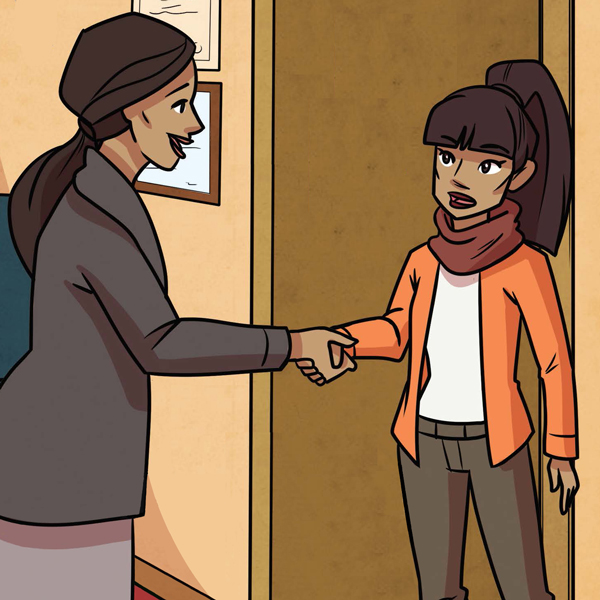 What can Emily do?
What can Emily do?
Be prepared
- Bring any court documents the social worker gave you. If the social worker didn't give you court documents, let your lawyer know.
- Try to remember the timeline of events in dealing with the ministry.
- Make a list of questions you want to ask your lawyer (see below).
Ask your lawyer these questions
- When can I see my children?
- What kind of order is the ministry asking for?
- Why is the ministry asking for this order?
- What can I do to address the social worker's concerns?
- Can we make sure my children's Aboriginal heritage is protected while they're in care?
- Can my children live with family or friends if they can't live with me?
- How can my band or Aboriginal organization be involved?
- Can you help me work out an agreement with the ministry? Can we use mediation or another collaborative process?
Words you might hear
Interim custody order
Your child must stay in foster care for a specific length of time (usually six weeks). The order can include an access order. The judge can make this order at a presentation hearing.
Interim supervision order
This kind of court order may say either:
- your child will live with you and you must follow certain supervision terms, or
- your child will live with someone else (a family member or friend) and the ministry will supervise the child's care.
- The order will last for a specific length of time (usually six weeks). The judge can make this order at a presentation hearing.
Temporary custody order
Your child must stay in foster care for a specific length of time. The order can include an access order. The judge can make this order at a protection hearing.
Temporary supervision order
This kind of court order may say either:
- your child will live with you and you must follow certain supervision terms, or
- your child will live with someone else (a family member or friend) and the ministry will supervise the child's care.
- The order will last for a specific length of time. The judge can make this order at a protection hearing.
Access
How you can see and talk to your child while they are in foster care.
Aboriginal community
Your community (for example, your band or First Nation).
Aboriginal representative
A person from your community (from, for example, your band or First Nation) who you choose to help you and be with you in court or at meetings.
Dwayne takes care of Greg
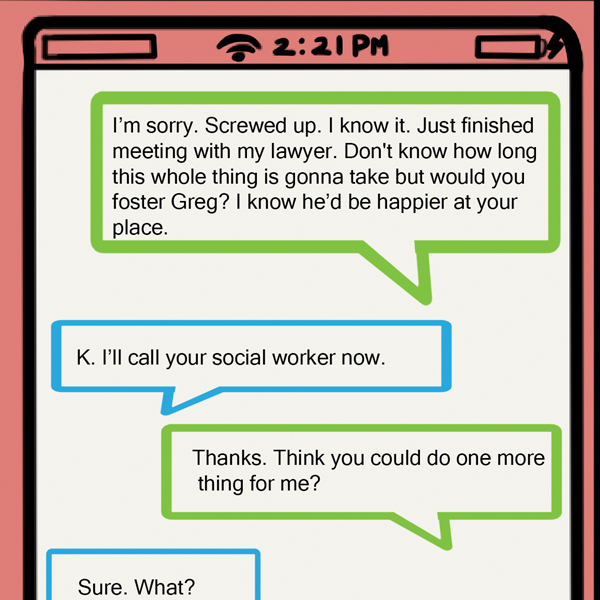 What can Emily do?
What can Emily do?
If a social worker takes your children from your home because you're temporarily unable to take care of them, you can ask to have family or friends care for them. This means that instead of going into foster care, your children will stay with someone they know. You can do this through an Extended Family Program agreement.
You can ask the social worker to place your children in the care of:
- a family member,
- a friend who has an important relationship with them, or
- someone who has a cultural or traditional connection to them.
For example, a grandparent, aunt or uncle, or a family friend could take care of your children.
How can the Extended Family Program help my family?
The Extended Family Program:
- gives your children a living arrangement that's less upsetting for them while you're unable to take care of them,
- is an alternative to foster care,
- builds on the strengths of your family and community, and
- can give your children's care providers financial help and other support services.
The Extended Family Program is a government program. The ministry runs the program. The program's goal is to return your children to you whenever possible.
Words you might hear
Extended Family Program
A government program run by the Ministry of Children and Family Development. It allows your child to be placed with someone they know if you're temporarily unable to take care of them. See also The Extended Family Program.
Extended Family Program agreement
An agreement you make with the social worker to have your child placed with someone they know (sometimes called EFP agreements).
Caregiver
The person looking after your children.
Child in the Home of a Relative Program
The program that used to provide support for relatives looking after children temporarily. It stopped taking new applicants in April 2010.
Emily goes to court
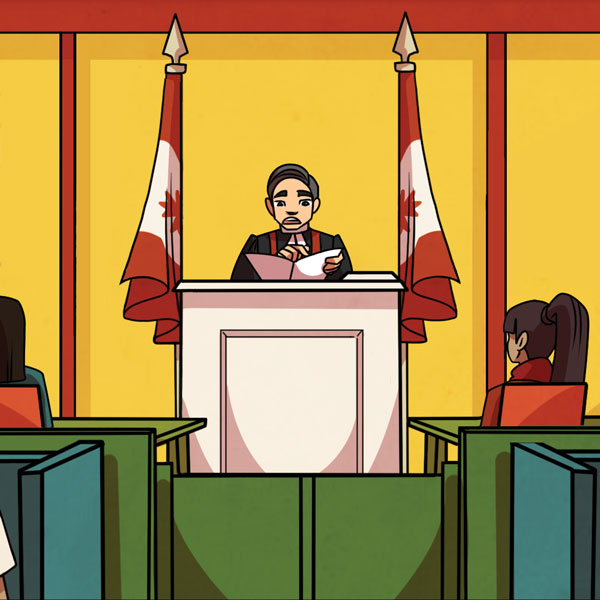 What can Emily do?
What can Emily do?
It's very important to plan to go to the presentation hearing.
Be prepared
- Get legal advice before the day of court. If you don't have a lawyer, talk to duty counsel at the court.
- Your lawyer can come with you to the presentation hearing. If your child is over 12, you can ask that they have their own lawyer at the hearing (a lawyer isn't always appointed for a child).
- If you can't get to court because you live in a remote location or you don't have transportation, ask if you can participate by phone.
- Ask for your child's Aboriginal representative to be there, even if it's only by phone.
- Make sure you're on time.
Remember that if you haven't already done so, you can ask for mediation at any time in the child protection process.
What can Dwayne do?
The child protection process is scary and overwhelming. Family members can help you by supporting you through the process. Just as Dwayne agreed to go to court and be in Emily's corner, any relative or other community member can go to court to offer their support.
Words you might hear
Report to Court
A written document that gives details about how and why your child was removed and what the director would like to see in an interim order.
Access order
A court order that says how you can see your child while they're in foster care.
Consent order
A court order that everyone agrees to.
Supervision order without removal
Your child will live with you with the ministry's supervision. The order will include the supervision terms you must follow. The judge can make this order at a presentation hearing.
Supervision terms
The terms and conditions that the judge sets to keep your child safe while under a supervision order.
Presentation hearing
The first time you go to court.
Interim supervision order
Your child will live with you, or with someone else (family member or friend) with the ministry's supervision. The order will say how your child will be cared for. A judge can make an interim order at a presentation hearing.
Interim custody order
Your child will stay in foster care for a certain amount of time. The order can also include an access order. A judge can make this order at a presentation hearing.
Emily makes a mistake
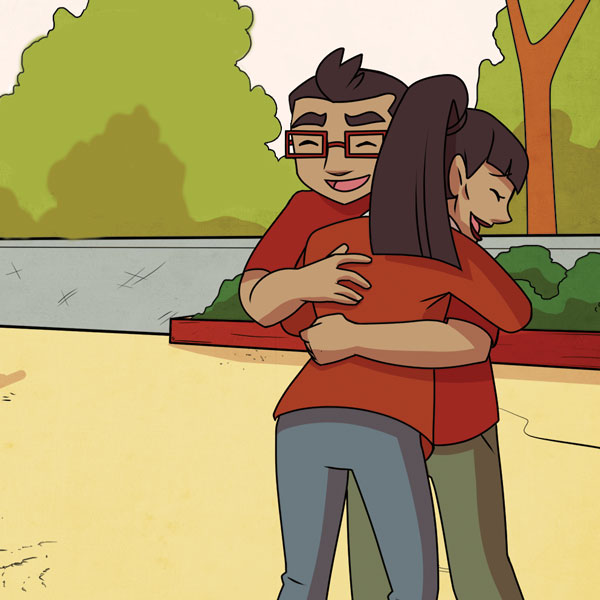 What can Emily do?
What can Emily do?
When Emily relapses, she's not sure whether she should tell her lawyer or social worker the truth.
Talk to your lawyer
It's a good idea to be honest with your lawyer. Give them all the facts. They will let you know what your options are and what the best next steps are. They can help you decide how to talk to the social worker about what's happened.
What can Dwayne do?
Emily gets through her difficult situation with help from her brother. Family members can support parents in crisis in the following ways:
- Reach out to them and help them stay connected to their support circle.
- Listen when parents share their challenges. But don't offer advice unless they ask for it.
- Encourage them to get the professional support they need.
- Provide concrete support that would make it easier for them to get professional help. For example, driving them to appointments, providing childcare, etc.
Sources: Children's Services Practice Notes, NAMI, The Nest
Emily goes back to court
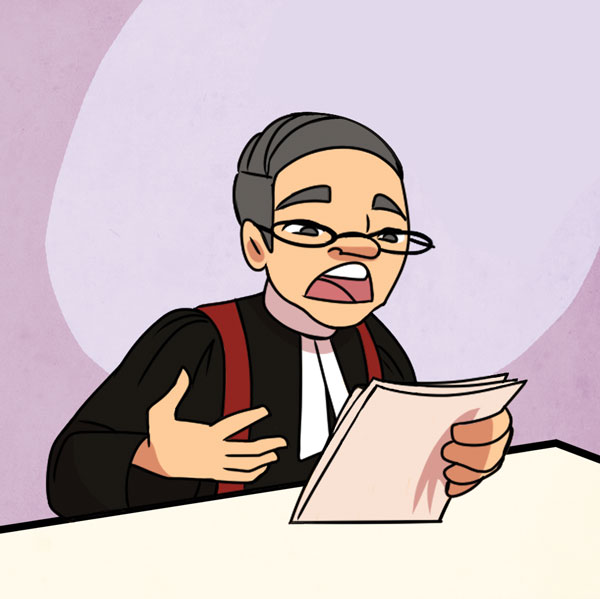 What can Emily do?
What can Emily do?
It's very important to plan to go to the protection hearing.
Be prepared
- Get legal advice before the day of court. If you don't have a lawyer, talk to duty counsel at the court.
- Ask for your child's Aboriginal representative to be there. If they can't come in person, ask if they can attend by phone.
- The social worker will apply for one of four types of orders. Read them over carefully. If there's anything you don't understand, get legal advice right away.
- If you don't agree with what the social worker asks for in the order, be prepared to tell the judge you don't agree.
- If you don't agree, be prepared to attend a case conference. But talk to your lawyer first.
- You may have to go back to court after the case conference. Get legal advice before the day of court. If you don't have a lawyer, talk to duty counsel at the court.
Remember that if you haven't already done so, you can ask for mediation at any time in the child protection process.
Words you might hear
Protection hearing
A protection hearing is the hearing that usually follows the presentation hearing. It must start no more than 45 days after the order is made at the presentation hearing.
Case conference
A case conference is an formal meeting at the courthouse between you, your social worker, the ministry lawyer (often called "director's counsel"), your lawyer, a representative from your Aboriginal community (if you want), and a judge, who leads the meeting. At this meeting, you will see if you can all agree. An order can only be made here if you all agree. It lasts about an hour.
Temporary supervision order
This kind of court order may say either:
- your child will live with you and you must follow certain supervision terms, or
- your child will live with someone else (a family member or friend) and the ministry will supervise the child's care.
The order will last for a specific length of time. The judge can make this order at a protection hearing.
Temporary custody order
Your child must stay in foster care for a specific length of time. A judge can make this order at a protection hearing. It can include an access order.
Continuing custody order
The ministry becomes the permanent guardian of your child. You lose all your guardianship rights. This means you lose the right to make decisions about your child.
The judge will usually only make a continuing custody order if there's a serious problem that can't be fixed within a certain amount of time.
Sometimes you can get an access order even if your child goes into the ministry's continuing custody.
Greg comes home
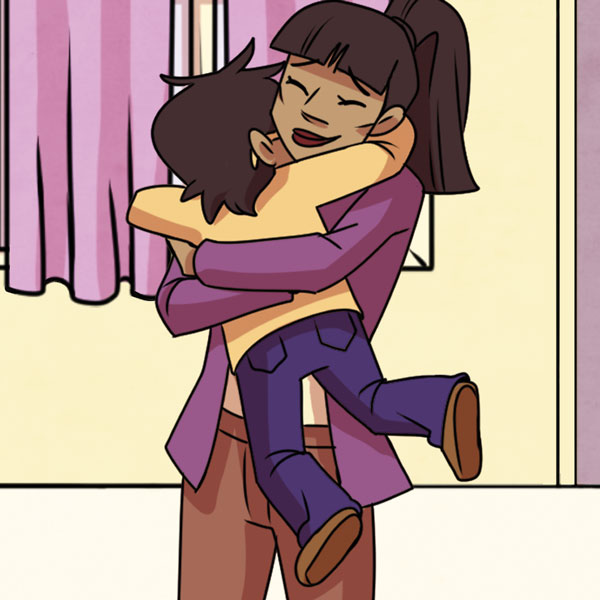 What can Emily do?
What can Emily do?
- Continue getting the professional support you need.
- Stay connected to your friends, family, and community. Ask for help when you need it.
- If you need more support, see Who can help below for information on in-person services that may be helpful to you.
What can Dwayne do?
- Help parents stay connected to their support circle.
- Encourage them to continue getting the professional support they need.
- Offer to provide childcare or other parenting support. This is especially important if you see the parent feels overwhelmed or needs a small break from parenting.
- Offer to help in other ways to help make sure the parent doesn't get overwhelmed again. For example, help with household chores, taking the children to school, taking the parent to their appointments, etc.
Sources: Children's Services Practice Notes, NAMI, The Nest
What about children who stay in foster care?
In Emily's Choice, Greg comes home. But this isn't always the case. If the judge makes a continuing custody order, this means that your child will stay in foster care indefinitely.
What can you do?
If this happens, talk to your lawyer right away to find out what your options are.
Talk to your family and friends to share how you're feeling and get the support you need. You may also want to reach out to your Aboriginal community to find out what kind of support they can offer.
What the ministry must do
The ministry must notify your child's Aboriginal organization to let them know your child is in foster care indefinitely.
Mediate BC — Has a list of child protection mediators in BC
KUU-US Crisis Line Society — Crisis line dedicated to the Aboriginal community — Call 1-800-588-8717 (24 hours a day)
See more
Community support services
Ministry of Indigenous Relations and Reconciliation — See their Guide to Indigenous Organizations and Services in British Columbia — Organizations that can help
Counselling and support
Salal Indigenous Support Programs — Healing for Indigenous survivors — Call 604-255-6344 — Vancouver
Crisis support and counselling
Salal Crisis Line — 24-hour Gender-Based Violence Crisis and Information Line — Call 1-877-392-7583 — Across BC
Health and wellness
BC Association of Friendship Centres — Find a friendship centre in your area
Legal help
BC211 — Free confidential referrals to help and information — Call 211
Indigenous community legal workers — Give legal information and limited advice services
Access Pro Bono Law Clinics — Free legal help
Family duty counsel — Free legal advice — Kwadacha and Tsay Key Dene — Call 1-877-601-6066
Family duty counsel — Free legal advice on family matters — Williams Lake — Call 778-395-6200
First Nations and Métis Outreach Program (The Law Centre, University of Victoria) — Free legal help, including family matters — Victoria
Legal aid navigators — Give legal information and provide referrals
Native Courtworker and Counselling Society — Call 604-985-5355 or 1-877-811-1190
PovNet — Information about poverty issues and links to organizations that can help
SHED Legal Advocacy Services — Legal advocacy, including child protection — Bella Coola
UBC Indigenous Community Legal Clinic — Free legal help on various legal matters — Call 604-684-7334 (Greater Vancouver) or 1-888-684-7334 (elsewhere in BC)
Upper Skeena Counselling Legal Assistance Society — Free legal help — Hazelton
Victoria Native Friendship Centre — Free legal clinic, including family matters — Call 250-412-7794

